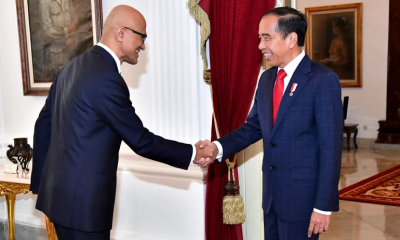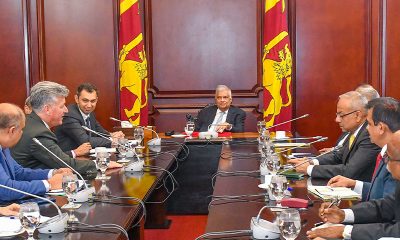Business
Expanding Ed-tech through partnerships, collaborations, and AI to improve quality education: Insights for Sri Lanka
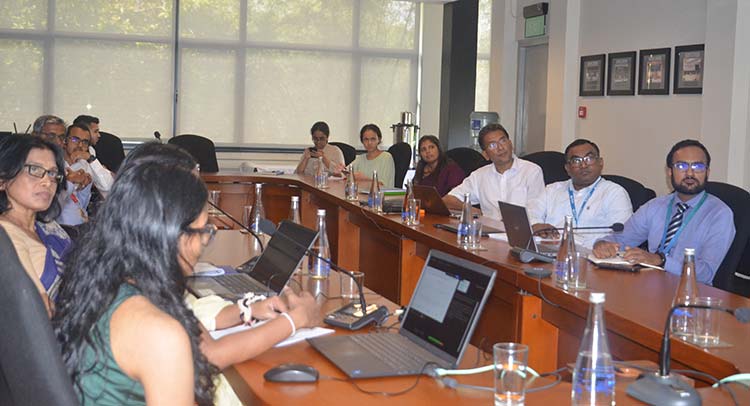
The COVID-19 pandemic underscored the critical role of technology in maintaining educational continuity during crises. As the world increasingly turns to educational technology (Ed-tech) solutions, it is essential to align these advancements with Sustainable Development Goal 4 (SDG 4), which advocates for inclusive and equitable quality education for all. The Institute of Policy Studies of Sri Lanka (IPS) recently hosted a hybrid Roundtable Discussion titled “Ed-tech Towards Achieving SDGs,” offering valuable perspectives on the role of Ed-tech in bridging educational gaps and the facilitators and barriers to the expansion of Ed-tech going ahead.
Currently, the primary focus in Ed-tech revolves around adapting to rapidly evolving technologies. There are also concerns that overreliance on technology could widen disparities in accessing quality education. The preceding discussion provides insights into how Ed-tech can be used to address these gaps and overcome barriers, emphasising the importance of regional cooperation and public-private partnerships, and the recent emergence of AI.
Regional Collaboration in Facilitating Ed-tech
A key insight from the discussion was the pivotal role of regional cooperation in accelerating the implementation and adoption of Ed-tech. Ms Cahya Raith from the Southeast Asian Ministers of Education Organization – Regional Open Learning Center (SEAMOLEC) underscored the role of knowledge sharing, joint research and development efforts, and collaborative capacity-building programmes in advancing Ed-tech in the region.
Similarly, the SEAMEO plays a crucial role in the region’s Ed-tech landscape, fostering innovative practices in Open and Distance Learning (ODL) with a keen eye on integrating metaverse and artificial intelligence (AI) technologies. They are also looking at enhancing the capabilities of educators through their regional training programmes which are designed to improve technology integration in the learning process.
The alignment of Southeast Asian countries towards a knowledge-based economy has emerged as a driving force in shaping Ed-tech policies in the region. Ms Ratna Hartine, representing Angel Investment Network Indonesia (ANGIN), noted that Ed-tech policies within the region are more focused on digitising national education data and administration. This includes establishing digital repositories like lectures, ebooks, simulation software and other learning materials, and seeking to expand access to quality education by leveraging mobile learning platforms and by equipping teachers with the required skills through teacher training programmes.
The discussion also shed light on the critical role of public-private partnerships (PPP) in expanding Ed-tech. Mr Asith de Silva, Senior Manager – Social Innovation at Dialog Axiata PLC, discussed how their collaboration with Sri Lanka’s Ministry of Education significantly contributed to the success of ‘the ‘Nenasa’ programme. Nenasa has been delivering educational content for Sri Lankan students since 2009 via a variety of technological means including TV channels and mobile apps, as well as teacher training programmes for teachers in utilising technology in the teaching process.
India’s ‘OLabs’ is another noteworthy PPP in South Asia that makes lab resources readily (anytime) and remotely (anywhere) available to students without access to physical labs or where equipment is not available in their schools due to scarcity or cost. The initiative was pioneered by AmritaCREATE and C-DAC under a research grant from the Ministry of Electronics and Information Technology in India, and collaborating and funding support from the public sector has been instrumental in developing such Ed-tech initiatives that support education in schools.
Improving Access for Vulnerable Groups
A significant part of the roundtable focused on using Ed-tech to enhance access to education for vulnerable populations. Several Ed-tech initiatives in South Asia, Southeast Asia, and the Middle East and North Africa (MENA) region that cater to this purpose include Pakistan’s ‘WonderTree’ initiative for children with disabilities, Indonesia’s ‘BEEP’ for out-of-school children, India’s ‘OLabs’ and ‘Class Saathi’ for rural children and children from underprivileged areas.
Importantly, Mr Georges Boarde, Senior Education Programme Specialist from the United Nations Relief and Works Agency for Palestine Refugees (UNRWA) in the Near East, highlighted the role played by the UNRWA e-learning platform in improving access to remote learning material and resources for Palestinian refugee students.
He also stated how they prioritise enhancing education resilience by improving the preparedness of students and teachers for remote learning and teaching in times of emergencies, such as the COVID-19 pandemic and the ongoing conflict in the region. While the UNRWA is a humanitarian organization that provides its services free to refugees, Mr Boarde highlighted the lack of internal revenue sources as a main barrier to implementing their plans for integrating technology in education, as well as the important role played by donors in facilitating the development of Ed-tech, including its scope and quality.
AI’s Role in Quality Education
The discussion also focused on how AI could help education. Dr Gharbi, CEO of Uptitude, a digital learning company, in Tunisia offered insights on the MENA region’s adoption of AI in education through platforms such as Zenon Academy and AI Mentor which uses gamification and other methods to enhance the learning experience of students. But she also emphasised the varying levels of AI integration across countries, with advanced implementations in the UAE and Saudi Arabia, and a growing interest in AI post-pandemic in Tunisia, Morocco, and Algeria.
To add to that, Ms Hartine highlighted Sekolah metaverse community, a PPP in Indonesia that uses AI, augmented reality (AR), and virtual reality (VR) to substitute learning environments like laboratories in schools that lack resources and funding by creating a community. She also noted how such visual experiences are useful for students who struggle with reading. Other participants from the roundtable further highlighted the role of AI in reducing resource requirements, including personnel, reducing costs, and guiding teachers, among its other uses.
Experts from the government sector, private sector, and donor agencies contributed valuable insights to the roundtable discussion. The event, based on a recent IPS study financed by the International Development Research Centre (IDRC) through Southern Voice and Group for the Analysis of Development (GRADE), provided a comprehensive overview of the Ed-tech landscape and its potential in achieving SDGs.
Business
Steps leading to the achievement of SL’s national interest in IOR
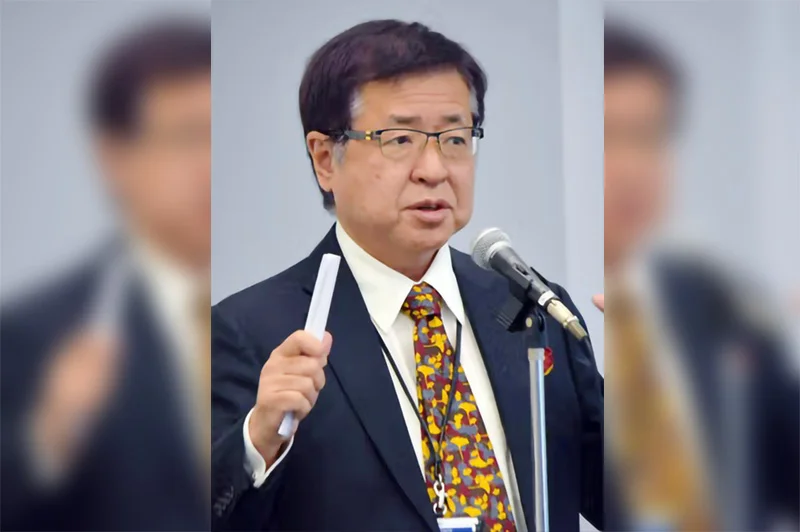
Sri Lanka needs to build awareness, effective policies and encourage regional multilateral frameworks to develop a multi-pronged approach to secure its national interest and safeguard regional stability in the Indian Ocean Region (IOR), as the region together with its seabed have become an area of strategic competition, former Assistant Chief Cabinet Secretary to former Japanese Prime Minister Shinzo Abe, Prof Nobukatsu Kanehara said.
“The Indian Ocean has been a maritime highway for millennia, with Sri Lanka being a midway point of the flow of trade, culture, technology and intellectual progress, Prof Kanehara said at the 4th Pathfinder Foundation Sri Lanka Indian Ocean Security Council Conference held recently at the Cinnamon Grand Hotel. The forum was presided over by Pathfinder Foundation Sri Lanka Chairman Ambassador (retd.) Dr. Bernard Goonetilleke.
The forum’s purpose was to obtain expert commentary regarding the need for Sri Lanka to ‘up its game’ in the IOR.
Abe said that from the 1870s onwards, the Indian Ocean had become the global communications highway, with the British Empire laying submarine cables from Aden to Mumbai, linking Europe to South Asia.
‘Since then, with the passage of time, Ceylon, and later Sri Lanka, has seen the bulk of the global digital communications umbilical laid through its maritime domain of influence, with over a dozen such cables laid over the island’s Exclusive Economic Zone (EEZ) thus far, he said.
Prof. Kanehera added: ” With the rise of Artificial Intelligence (AI) and increasing digitisation, such submarine cables have become critical strategic infrastructure for the island nation as well as the region.
‘This timely conference came as world powers rushed to secure critical minerals needed to maintain a technology edge over rivals, both militarily and economically, disrupting the longstanding rules-based order, especially at sea and in trade.
‘The lack of cognition regarding how to understand and navigate the return to a near Cold War era strategic competition in the Indian Ocean, and increasingly in the sub-surface domain and the seabed, among Sri Lanka’s policy making community, bureaucrats and public leaves the economically weakened island nation more vulnerable to geopolitical coercion, shocks and tug-o-war, which will likely increase in the coming decade.’
By Hiran H Senewiratne
Business
Automobile Association of Ceylon donates towards Disaster Relief Support Fund
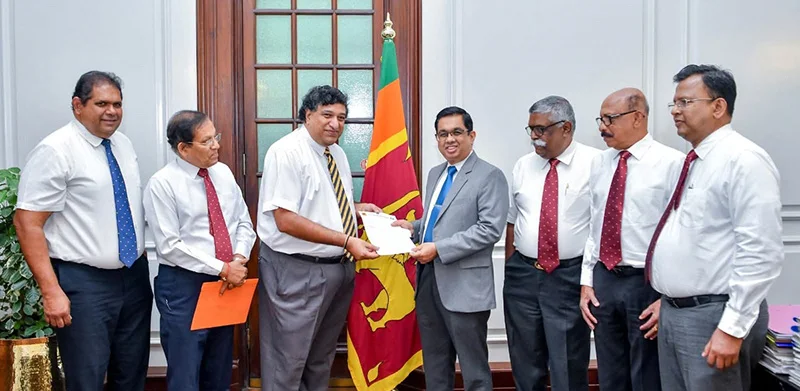
Automobile Association of Ceylon (AAC) donated Rs. 25 Million towards the Disaster Relief Support Fund to assist the Ditwah Cyclone victims.
A donation was handed over to Dr. S N Kumanayake, Secretary to the President of Democratic Socialistic Republic of Sri Lanka by Dhammika Attygalle, President – AAC at the Presidential Secretariat on the 19th February 2026 in the presence of Executive Committee members.
Dhammika Attygalle President AAC (third from Left) handing over the cheque to Dr S N Kumanayake, Secretary to the President of Democratic Socialistic Republic of Sri Lanka.
In the picture L-R Lasitha Gunaratne- EXCO Member – AAC, Devapriya Hettiarachchi – Secretary -AAC, P H Liyanage, P B Kulatunga & Indunil Udaya – Members of the EXCO – AAC
Business
‘Sri Lanka’s first AI-powered digital trainer for Banca partners’

HNB Assurance PLC recently introduced NAVI, The Digital Trainer, a new AI-powered training companion designed to support its banca staff with instant, reliable access to knowledge, whenever they need it. The solution was unveiled at Partnership Life, the company’s annual forum dedicated to celebrating the performance of its Partnership Channel.
Built to make learning simpler and more accessible, NAVI is a voice-enabled AI chatbot that helps banca staff quickly find product information, policy details, and process-related guidance by drawing from a centralized knowledge bank. Whether on the go or at the point of customer interaction, NAVI ensures that answers are never out of reach.
Sharing his thoughts, Sanesh Fernando, Chief Business Officer / GM – Partnership Channel at HNB Assurance, opined, “With NAVI, our intention is to make learning a part of everyday conversations. By combining chat and voice capabilities, we are making it easier for our officers to learn on demand and perform with greater confidence.” He further noted that it is this continuous focus on meaningful innovation that has consistently set HNB Assurance apart within the bancassurance space. “Solutions like NAVI reflect the way we think and operate as a Partnership Channel. This commitment to enabling our partners and bancassurance officers through practical, forward-thinking initiatives has been a key driver in our journey, one that has seen us being recognized as the Best Life Bancassurance Provider for five consecutive years, while also delivering strong and sustained growth year after year.”
Commenting on the launch, Suneth Jayamanne, Chief Information Officer / GM of HNB Assurance, said, “We see NAVI as a support system rather than a piece of technology. Our Bancassurance officers operate in fast-paced environments and having instant access to the right information can make all the difference. NAVI is about helping our people feel more prepared, more confident, and more connected to the knowledge they need to serve customers better.”
The launch of NAVI was marked by an engaging reveal featuring an AI-generated avatar that introduced the digital trainer and its capabilities, symbolizing a shift towards a more intuitive and people-friendly approach to learning.
As HNB Assurance continues to expand its Partnership Channel, innovations such as NAVI highlights the company’s focus on building strong, well-supported partnerships, blending technology with a deep understanding of how people learn, and work.
HNB Assurance PLC (HNBA) is one of the fastest growing Insurance Companies in Sri Lanka with a network of 79 branches. HNBA is a Life Insurance company with a rating of ‘A’ (lka) by Fitch Ratings Lanka for ‘National Insurer Financial Strength Rating’. Following the introduction of the segregation rules by the Insurance Regulator, HNB General Insurance Limited (HNBGI) was created and commenced its operations in January 2015; HNBGI continues to specialize in motor, non-motor and Takaful insurance solutions and is a fully owned subsidiary of HNB Assurance PLC. HNB General Insurance has been assigned a ‘National Insurer Financial Strength Rating’ of ‘A’ (lka) by Fitch Ratings Lanka Limited. HNBA is rated within the Top 100 brands and Top 100 companies in Sri Lanka by LMD and HNB Assurance has won international awards for Brand Excellence, Digital Marketing and HR Excellence including the Great Place To Work® Certification, and won many awards for its Annual Reports at award ceremonies organized by the Institute of Chartered Accountants of Sri Lanka.
-

 Features3 days ago
Features3 days agoWhy does the state threaten Its people with yet another anti-terror law?
-

 Features3 days ago
Features3 days agoReconciliation, Mood of the Nation and the NPP Government
-

 Features3 days ago
Features3 days agoVictor Melder turns 90: Railwayman and bibliophile extraordinary
-

 Features2 days ago
Features2 days agoLOVEABLE BUT LETHAL: When four-legged stars remind us of a silent killer
-

 Features3 days ago
Features3 days agoVictor, the Friend of the Foreign Press
-

 Latest News4 days ago
Latest News4 days agoNew Zealand meet familiar opponents Pakistan at spin-friendly Premadasa
-

 Latest News4 days ago
Latest News4 days agoTariffs ruling is major blow to Trump’s second-term agenda
-

 Latest News4 days ago
Latest News4 days agoECB push back at Pakistan ‘shadow-ban’ reports ahead of Hundred auction




